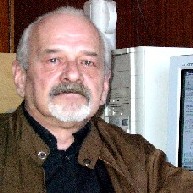 |
 |
 |
|

| Main |
People |
B.E/Tech.
Education |
M.E/Tech.
Education |
Postgraduates |
| Research |
Grants |
Publications |
WebLinks |
News |
| E
E E Coordinator - |
Igor N. Evdokimov, professor of the
Physics Department |
||
 |
Why EEE? We
wanted to emphasize some of the key concepts in our teaching and
research
(T&R) activities. The main subjects of these T&R
are petroleum disperse
systems, particularly entities with reduced dimensions such as
supramolecular assemblies, nanoparticles, surfaces and interfaces.
|
||
| ENERGETICS.
A common wisdom is
that the genesis of petroleum on a geological time scale (from
macromolecular
kerogen to thermodynamically favored low-MW compounds) is determined by
intramolecular energetics supplied by strong chemical bonds. In our
T&R we
support an opinion that on an “industrial” (present day) time scale of
equal
importance is intermolecular energetics of comparatively weak bonds in
supramolecular aggregates, molecular nanoclusters and the like. In this
respect, some of the most “energetic” petroleum species are
self-associating
asphaltenes. |
|||
| EVOLUTION.
Dramatic changes in
industrially important macroscopic bulk properties of petroleum may be
caused
by evolution / transformation of supramolecular / nanosize structures.
The
respective weak bonds may be relatively easily affected by variations
in a
number of parameters of the system, such as temperature, pressure and
also by
changes in the composition of the surrounding environment. The
evolution of a
petroleum nanodispersion is viewed as a kinetically controlled process
where
intermediate structures are apparently separated from the equilibrium
states by
large kinetic barriers and may be (meta)stable for months or years. |
|||
| ECOLOGY.
The main emphasis of
T&R is on transformations of reservoir properties induced by
technological
operations. Among these are adsorption at rock surfaces of petroleum
components
and of chemicals from drilling and EOR fluids, contamination of
underground
waters, build-up of mechanical stresses due to pressure / matter
depletion,
surface subsidence, etc. |
|||
|
The long-term goal
of our work -
development of the scientific basis for emerging PETROLEUM NANOTECHNOLOGIES. [Russian – Language presentation] |
|||
|
A set of our publications on petroleum nanotechnologies (prior to
2007) was awarded The N.K. Baybakov Prize by International Fuel and Energy Association [PDF - submission letter for the Prize by the Rector of Oil and Gas University (in Russian)] [PDF - copy of the Prize diploma] |
|||
|
In 2009, the research "Control of
Indigenous Crude Oil Nanocolloids as the Basis of “Clean” Petroleum
Nanotechnologies” was nominated for The Eni Award “New Frontiers of Hydrocarbons” [PDF - version of the Candidature Proposal] |
|||
| Contact us at : |
|||
| physexp@gubkin.ru |
Last update : 25.02.2009 |
||




